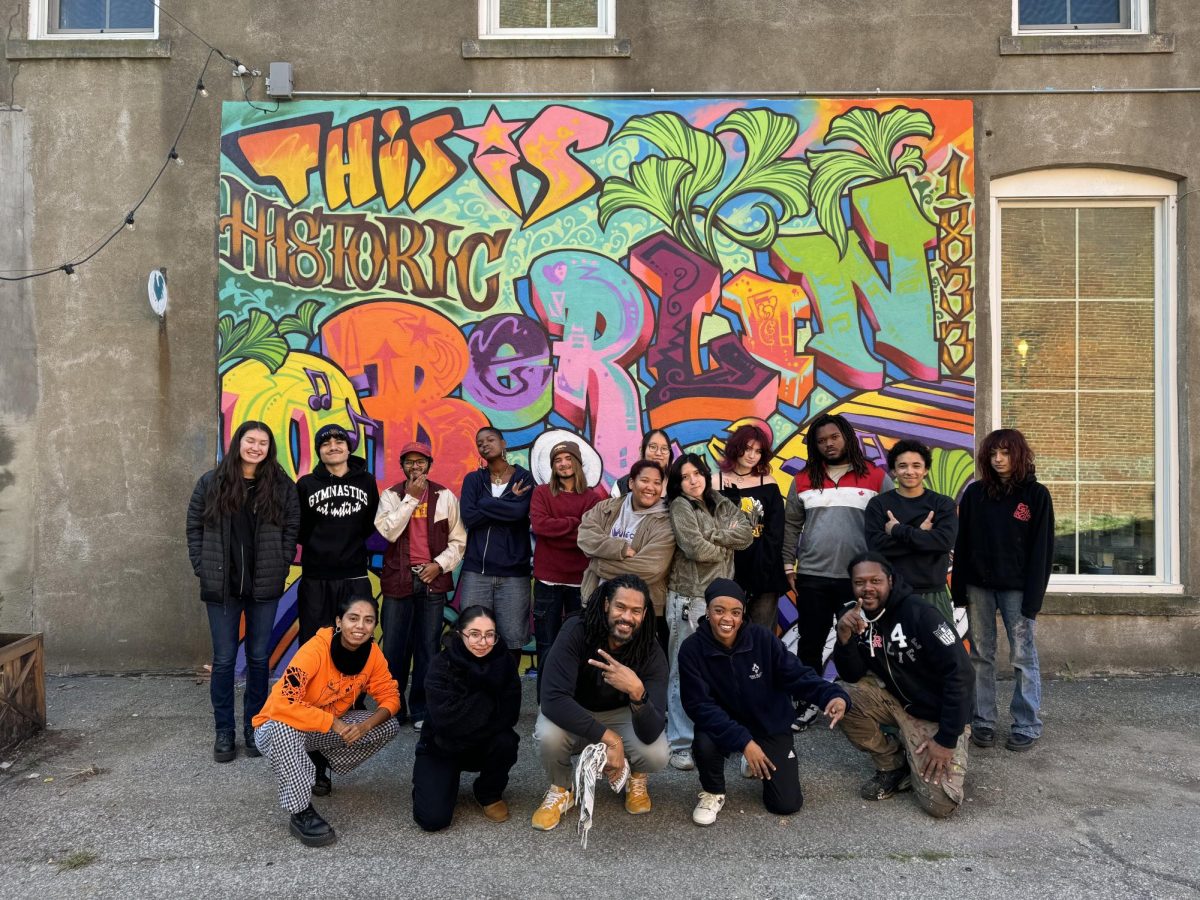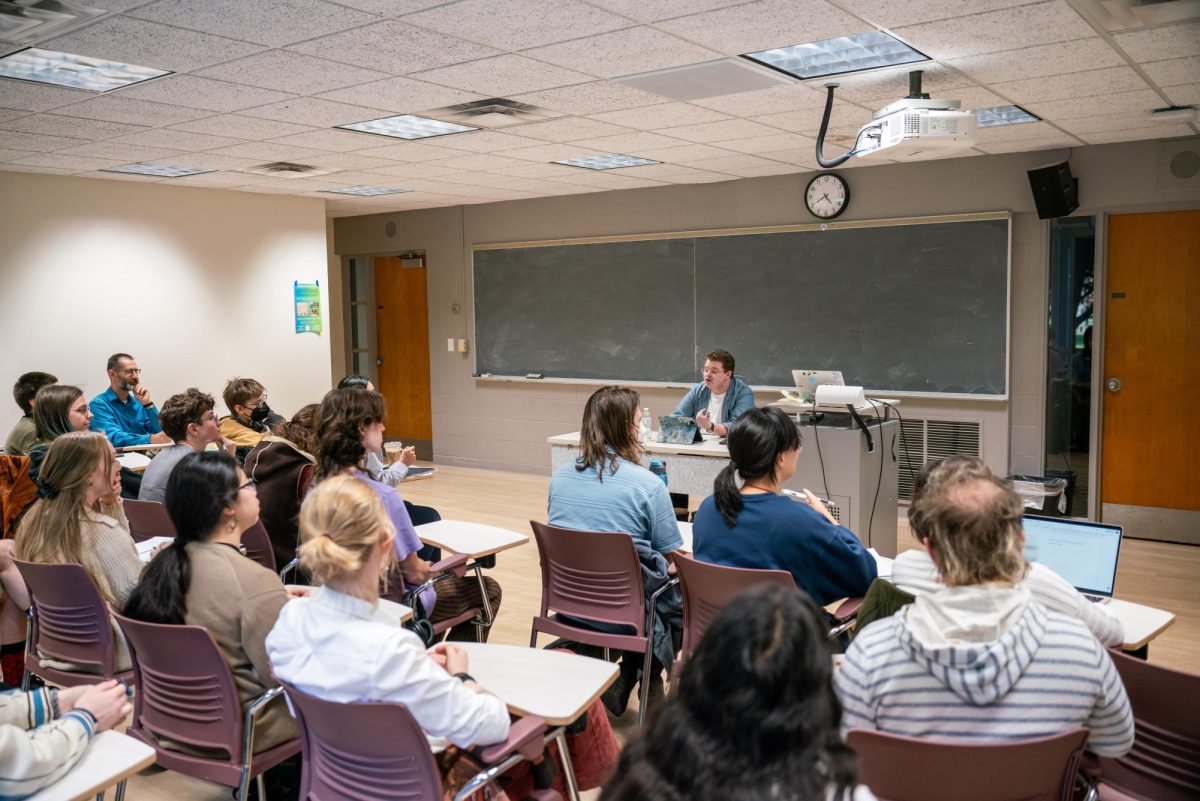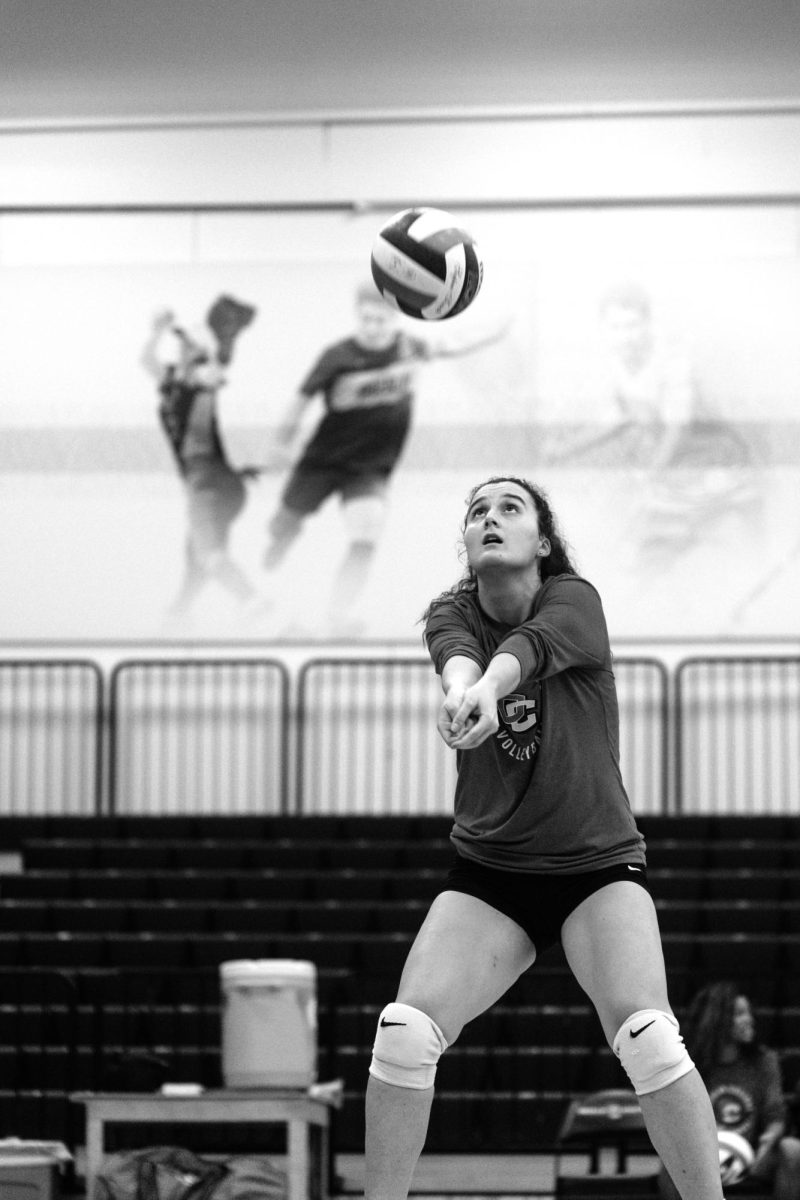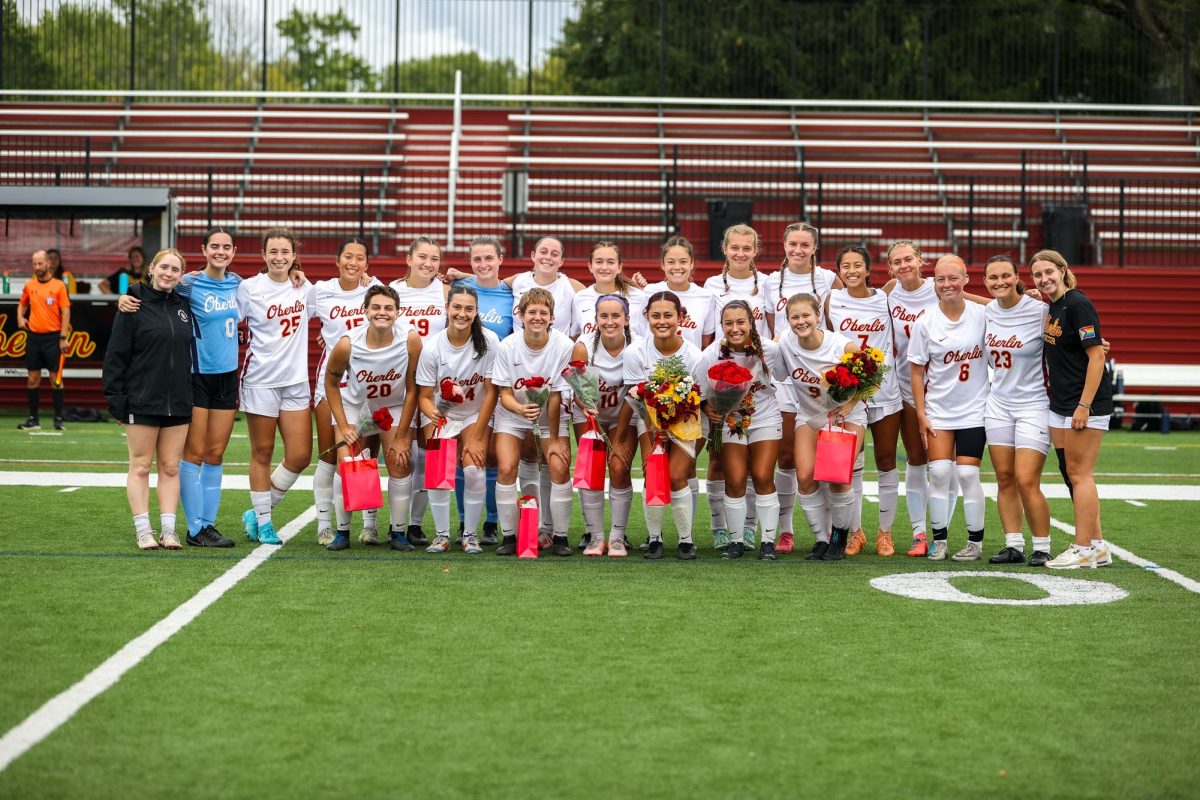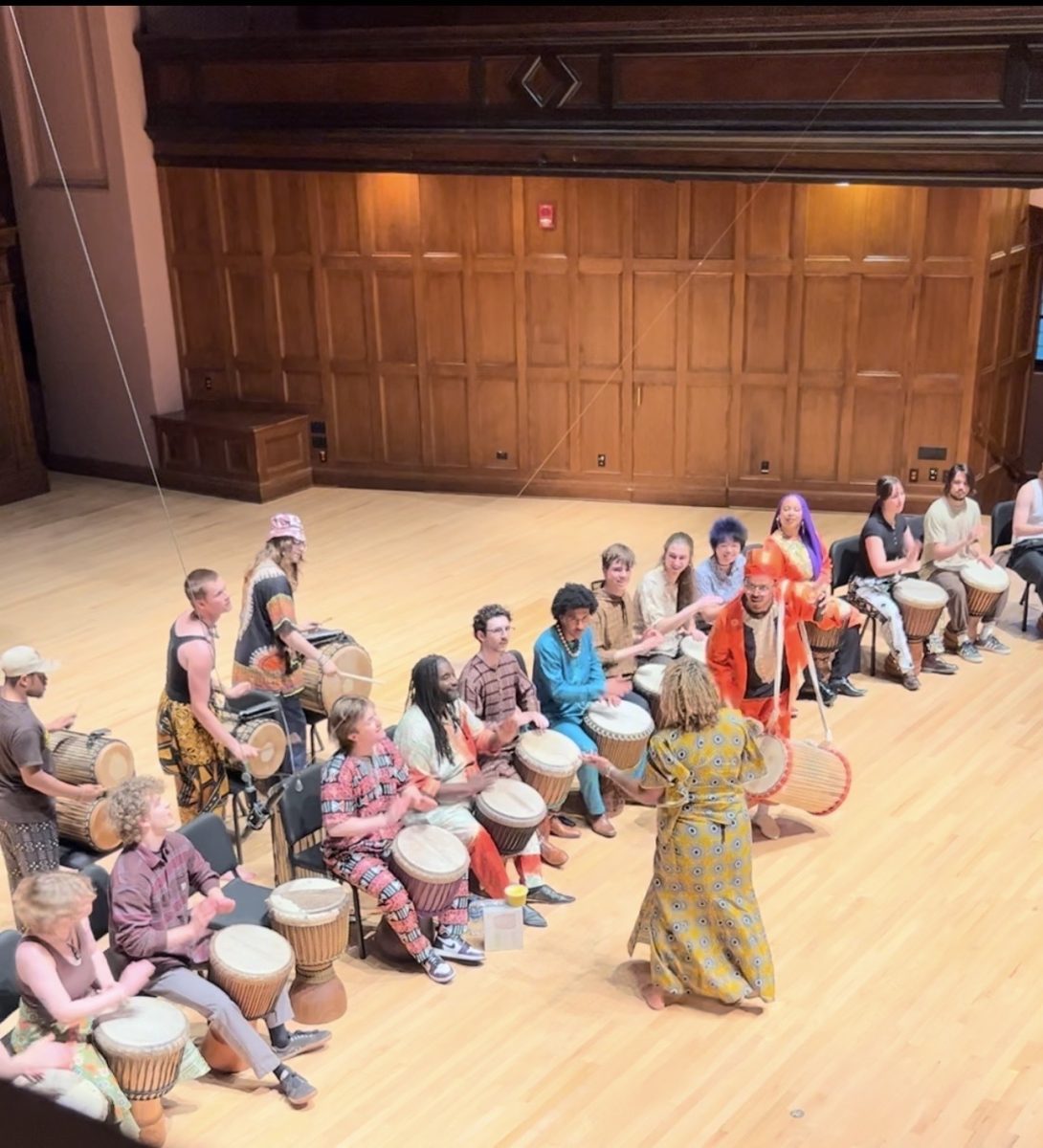Creative Writing Students Mentor Young Poets
December 5, 2014
“I was told to write a love poem. I have a try and hope you like it,” seventh-grader Emma Comings read into the microphone on the Cat in the Cream stage, beginning her unassuming but gorgeously lyrical love poem “Sorry, I Tried.” Comings was one of 100 sixth-, seventh-, and eighth-grade students from Langston Middle School who collaborated with Oberlin students in Creative Writing 450: Teaching Imaginative Writing, where they explored, wrote and published poetry. She was one of the 48 students who shared their poems in the packed Cat in the Cream this past Monday as part of the Langston Middle School Poetry Celebration.
“I was so scared that people were going to judge me for my poem, because it wasn’t a normal love poem that you would write to somebody,” Comings said after the event, reflecting on her performance. “It’s not cheesy,” she added, grinning. “You’re addressing the person in a way they didn’t expect.”
“Sorry, I Tried,” a deliberately self-effacing spin on the classic love poem, did not represent the only unexpected poetic take that the students shared. Sixth-grader Anna Dedecek evoked the Manhattan subway in “the taste of a two-day-old doughnut with cinnamon and chocolate on it,” while seventh grader Ewan Inglis provided a whimsical step-by-step guide for painting the human mind. The children’s mentors, college students from the Teaching Imaginative Writing class, prompted their imaginations with exercises that urged them to, for example, write from the perspective of a beloved childhood object or cast a terrifying being in a sympathetic light.
Assistant Professor of Creative Writing Lynn Powell established and currently teaches the Teaching Imaginative Writing course in which she promotes the importance of imagination among middle school children. “It’s at least an ethical and moral imperative that people exercise the muscle of imaginative thinking,” Powell said, discussing the significance of her work. “The best poetry asks us to do that. It takes us inside someone else’s experience.”
Powell first introduced the course in the spring semester of 2004 as a Creative Writing practicum, a partial-credit course designed to teach practical applications of academic material. Powell taught the course again in this format in 2005 and 2006. After a four-year hiatus, during which Powell did not teach at all at Oberlin, the course returned in the spring of 2010 as a full-credit course, bolstered by the support of President Krislov.
Powell said that the fundamental format of the course has not changed much from its original incarnation. She accepts eight to ten students into the class each semester. Early in the course, Powell models what a typical lesson for the middle school students might look like, and then invites her students to craft individual lesson plans that generally revolve around teaching a piece of contemporary poetry and using it as an impetus for a writing exercise. The students then workshop their lesson plans extensively in the class to hone their approach.
“Workshops can be pretty tough,” Powell said. “There’s a lot at stake.” Nevertheless, she emphasizes to her students the unpredictability of the educational enterprise.
“It’s never about teaching the perfect class,” she said. “It’s going in as well-prepared as you can be, as passionate as you can be.”
During the second half of the semester, Powell’s students bring their lessons to the Langston Middle School students. This year, Powell divided her students into pairs and assigned them to work with one of five classes: two sixth-grade classes, two seventh-grade classes, and one eighth-grade class. The seven-day residencies culminated in the middle school poets selecting, from among the poems they had written over the course of the week, those that would be anthologized. The college students then produced and distributed these anthologies among the middle school classes. The collections represent the work of all of the students in each class.
The annual Langston Middle School Poetry Celebration was an opportunity for the poets to share their work with a diverse Oberlin community, including their parents, peers and College students. Nearly 200, including the 48 middle school students themselves, attended Monday night’s reading.
In orchestrating this collaboration, Powell draws from rich experience as both a writer and an educator. She is the author of two published books of poetry, Old and New Testaments and The Zones of ParadiseFI, and a nonfiction work, Framing Innocence: A Mother’s Photograph, a Prosecutor’s Zeal, and a Small Town’s Response. In working with the students in Teaching Imaginative Writing, she draws from an over 20-year career as a Writer-in-the-Schools, during which she strove to encourage K-12 students in diverse public school systems to actively engage with poetry.
Powell received her first teaching position in 1979, shortly after graduating from Cornell University. Her MFA in creative writing led her to become a Poet-in-the-Schools in rural Jefferson County, TN, where she grew up. Reflecting on her initial performance as an educator, Powell was lighthearted but ruthlessly critical.
“I’m sure I was pretty terrible at first,” she said.
Nevertheless, Powell said she realized through this experience that despite her lack of professional training, the students she worked with were surprisingly receptive to her invitation to exploring poetry and challenging their preconceptions of it as a tedious literary form. These preconceptions, she said, stem from the devaluation of poetry in American culture and the corresponding incompetence with which it is often taught.
“Where I grew up, [poetry] was very badly taught, because it was taught by people who didn’t have any real, honest feel for it,” she said. “They were going to talk about the symbolism and write a summary of what the poem was about, and call that [the] experience of poetry.”
In contrast, what Powell endeavored to do as a Writer-in-the-Schools was to urge students to experience poetry viscerally and to use it to explore their interior lives; as well as those of others. She strives to impart her wisdom to her students through Teaching Imaginative Writing.
The many college students involved, for their part, said they gained valuable insightson their own approach to poetry through the process of preparing their lesson plans. As part of the workshop, Powell asked the students in her class to try out the writing prompts that they were going to give to the Langston students. College senior Miryam Coppersmith said that this was liberating.
“I wrote some of the best poetry I think I’ve ever written in my life,” Coppersmith said, regarding her responses to the prompts. “A lot of college-age writers get very in our own heads and self-edit a lot.” The inventiveness of the prompts, she said, encouraged her to break out of the need to write “serious” poetry with unnecessarily complex forms.
College senior Annie Rasiel expressed her surprise at and admiration for the unabashed sentimentality and vulnerability of the students, many of whom wrote poems that grappled with themes of unrequited love or difficult home situations.
Coppersmith and Sydney Spiro, another College senior who taught the same seventh grade class as Coppersmith, said that they hope that the night’s celebration conveyed to the audience the value of this collaborative effort. Spiro urged the College to expand Powell’s budget for the program, saying that, with greater resources, Teaching Imaginative Writing would have the potential to reach even more middle school students.









